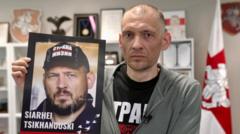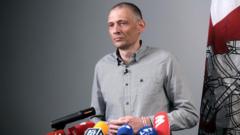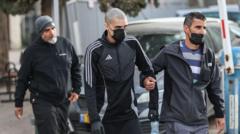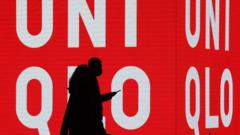In an exclusive account, Australian Matthew Radalj details his harrowing five-year experience in a Chinese detention center, shedding light on the psychological and physical torment he faced, and his vow to help those still imprisoned.
"From Darkness to Light: The Harrowing Journey of an Australian Prisoner in China"

"From Darkness to Light: The Harrowing Journey of an Australian Prisoner in China"
Matthew Radalj endures psychological and physical torment over five years in a Chinese prison, emerging with a mission to aid fellow inmates.
Matthew Radalj, an Australian citizen, spent five grueling years behind bars at the Beijing No. 2 prison, a facility notorious for housing international detainees and inflicting severe psychological and physical punishment. Now living outside China, he has bravely shared his traumatic experience, which involved not only forced labor, sleep deprivation, and inadequate food but also a unique system designed to inflict psychological torment.
Radalj was wrongfully convicted during a dispute over a mobile phone repair in January 2020, leading him to sign a confession under duress after two days of relentless beatings and denial of basic needs. He highlighted a vicious cycle of abuse, where inmates were often deprived of essential hygiene and food, and where the so-called "good behavior points system" served as both enticement and manipulation.
Each month, prisoners could earn points supposed to lead to a sentence reduction, but the process was rife with pitfalls. Grievous infractions included the smallest violations, like incorrectly displaying personal items or hoarding food, leading to a no-win environment designed to maintain despair and control. Former inmates corroborated Radalj's accounts, sharing similar harrowing tales of unjust measures and psychological torture.
Food, a significant tool of control, predominantly consisted of inadequate meals, which resulted in malnutrition among inmates. Radalj described a treacherous environment where daily life involved maintaining composure against constant threats of punishment and isolation.
Among the grimmest aspects of his ordeal was a prolonged stint in solitary confinement, where the absence of light forced him to confront his sanity amid despair. He recounted how solitude drove him to self-converse, reflecting profound emotional strains placed upon him by the brutal regime.
Throughout his ordeal, Radalj maintained a journal documenting his experience, which he secretly aimed to smuggle out. However, attempts to notify the outside world of the unjust conditions faced by his fellow inmates were fraught with danger. On his release, he faced the strenuous task of confronting the trauma of incarceration, but also found strength in providing assistance to families of inmates still enduring the oppressive conditions within.
Since returning to Australia, he has rebuilt his life, marrying his long-time girlfriend and dedicating himself to raising awareness about the plight of his fellow detainees. With a fierce sense of gratitude for his newfound freedom and a resolve to act as an advocate for those still trapped in the same harrowing circumstances, Radalj continues to foster a legacy of support and hope borne from his harrowing journey through oppression.



















